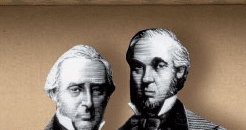 Cyrus and James Clark
Cyrus and James Clark
Clarks Shoes started in 1825 as a business making sheepskin rugs and slippers. Their sheepskin slipper, named the ‘Brown Petersburg’, was a huge success. Within years of its unveiling, its unique design graced feet the length and breadth of the country and by 1842 sales were averaging 1000 pairs a month.
The ‘Brown Petersburg’ was made by hand in the town of Street. There were no factories, so the brothers – trading as C&J Clark Limited – relied on outworkers to meet the growing demand. The workers collected the leather from the tannery, along with a pattern, took the whole lot home and turned it into slippers. Production was often a family affair – everyone did their bit of cutting, sticking and sewing. Then, every Friday, all the finished footwear would be taken to Cyrus and James and swapped for wages.
The system worked well for many years. The good people of Street were happy in their work and the company prospered. In fact business was so brisk that in 1851 the Clark brothers won two awards at the Great Exhibition, an event organised by Prince Albert to showcase the achievements of British industry.
Then, in 1863, disaster. A recession hit business badly and, almost overnight, the Clarks needed help. Lifelong Quakers themselves, they turned to contacts in the Quaker community for financial support and managed to secure a loan. But it came with conditions: James and Cyrus were to step down and William – James’ youngest son – was to take the reins.
It was another turning point in the company’s fortunes. Something of a visionary, William modernised the manufacturing process by bringing in the factory system and investing in the Singer sewing machine – a groundbreaking piece of technology at the time. Under his watchful eye, C&J Clark was revitalised, the loan was paid back in full and the company continued to move forward with developments like the Hygienic range. Launched in 1883, it was the first ever shoe designed to fit the shape of the foot; an innovation that is still the bedrock of Clarks’ reputation.
Whilst developing the commercial side of the business, William remained true to the ideals of his Quaker roots. He invested in the community, looked after his workers and built them homes – many of which can still be seen in Street today.
Retweet about this article
Geoff Knott, 15/06/2016